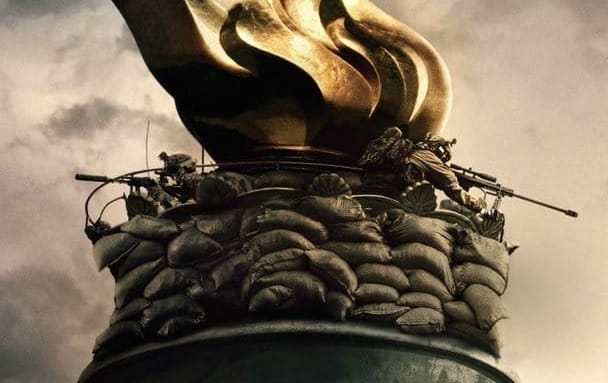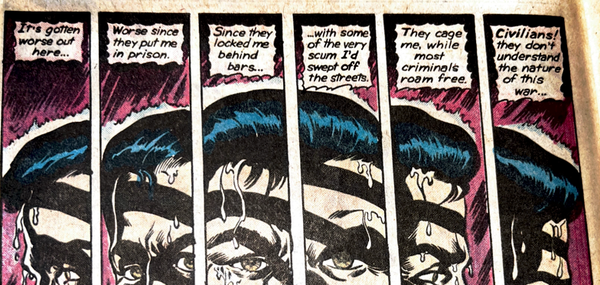How's that Civil War Going?

A both/and story.
Quick note to subscribers: I've decided to move my newsletter from Substack to Ghost for several reasons. Hopefully, you won't notice a difference, but if you have any issues, don't hesitate to email me.
1
Last year, Alex Garland’s movie Civil War imagined a near-future America in all-out domestic conflict.
The film picks up late in the game. An unnamed president, serving his third term, is besieged by violent secessionist movements on three fronts. We learn that the president is a fabulist who lies about military victories, has abolished the FBI, and is frequently referred to by other characters as a fascist.
The story focuses on four journalists who embark on a road trip from New York to Washington D.C. in an attempt to interview the president before rebel forces close in and depose him.
By dropping us in medias res, Civil War gives the audience a visceral experience of what Clausewitz called “the fog of war.” We learn little about what circumstances have led the current moment. In the most hair-raising scenes of the film, it’s impossible to tell who is shooting at whom, and why. When the reporters find themselves pinned down in a roadside sniper standoff, the character Joel tries to figure out what’s going on:
JOEL: …What’s going on?
SPOTTER: Someone in that house. They’re stuck. We’re stuck.
JOEL: …Who do you think they are?
SPOTTER: No idea.
…
JOEL: Are you WF? Who’s giving you orders?
SPOTTER: Nobody’s giving us orders, man. Someone’s trying to kill us. We’re trying to kill them.
JOEL: You don’t know what side they’re fighting for?
2
For obvious reasons, Civil War generated a lot of discussion about how likely such a scenario was, especially if Donald Trump won the election.
Experts on democracy and civil conflict were divided, but several seemed to think all-out civil war as portrayed in the film was unlikely. Many believed that a kind of Orbánism — the "soft" hybrid authoritarian approach of Hungary's Prime Minister and quasi-dictator Viktor Orbán — was a more plausible outcome.
Nine months into the Trump administration, I'm still not sure how to assess this prediction.
3
On September 10, 2025, a lone gunman assassinated right-wing MAGA speaker and podcaster Charlie Kirk. Within 48 hours, police apprehended 22-year-old Tyler Robinson and charged him with the murder.
In addition to his inflammatory comments on race and religion, Kirk was known for harsh rhetoric towards LGBTQ people, comparing Pride to drug addiction, calling trans athlete Lia Thomas "an abomination," and trans people in general "a throbbing middle finger to God."
The authorities have released text messages between Robinson and his romantic partner, a trans woman. Robinson's partner appears to have been shocked when Robinson confessed he was the killer. “I had enough of his hatred. Some hate can’t be negotiated out,” Robinson wrote.
Independent journalist Ken Klippenstein quoted one of Robinson’s childhood friends as saying, “Obviously he’s okay with gay and trans people having a right to exist, but also believes in the Second Amendment.”
According to the New York Times, President Trump immediately laid out plans to use Kirk’s killing as a reason to “silence opponents” by “target[ing] liberal groups, monitor speech, revoke visas and designate certain groups as domestic terrorists.”
4
Rachel Kleinfeld, a senior fellow at the Carnegie Endowment for Peace and expert on political violence, speaking on PBS:
Political violence is highly predictable ... it’s highly predictable what makes it go up and what can make it come down ... What we need is for our political leaders on both sides to condemn [violence] unequivocally. And then, as communities, we have to say, no longer, not on our watch.
They are at war with us! Whether we want to accept it or not, they are at war with us! And what are we gonna do about it? ... We are going to avenge Charlie’s death in the way that Charlie wanted to be avenged.
5
On September 17th, ABC suspended Jimmy Kimmel’s late-night television show after two of the largest local affiliates abruptly said they would no longer air the program. The affiliates were responding to comments Kimmel made about the Kirk assassination during his opening monologue. ABC is owned by Disney.
In his monologue, Kimmel said:
We hit some new lows over the weekend with the MAGA gang trying to characterize this kid who killed Charlie Kirk as anything other than one of them and doing everything they can to score political points from it.
FCC Chairman Brendan Carr, a Trump appointee, called the comments “some of the sickest conduct possible,” and suggested that the commission could suspend the licenses of local affiliates if they continued to air the shows. Nexstar and Sinclair, two large owners of local TV stations, said they would suspend the show. As the New York Times explained, "Nexstar is seeking to buy a rival, Tegna, for $6.2 billion, a deal that needs F.C.C. approval; Sinclair is known for its conservative leaning."
ABC's decision echoes other recent capitulations to the demands of the Trump regime, including Paramount's cancellation of Trump critic Stephen Colbert as it sought approval for another merger.
According to Hungarian economist and politician Gábor Scheiring, both Kimmel and Colbert's cancellations "reek of "Orbánism."
6
The brilliance of Orbánism is in its subtlety. This is also, no doubt, part of its appeal to conservative influencers in the United States, who have advocated taking Hungary as a model.
Since he took office in 2010, Orbán has methodically consolidated control over the various parts of the Hungarian government and civil society. Pro-government oligarchs have bought up most private media, creating a pliant press. Corruption is endemic. Allies receive state contracts and special regulatory advantages.
European Union funds theoretically earmarked to support agriculture and rural development flow to family and friends. According to a New York Times investigation, the "government has auctioned off thousands of acres of state land to his family members and close associates, including one childhood friend who has become one of the richest men in the country."
The capture and misappropriation of EU funds is ironic, given Orbán's constant rhetorical attacks on degenerate Europe. But membership in the Union also provides constraints.
Compared to classical fascist regimes, Hungary has relatively little centralized state violence and is not outwardly aggressive toward other countries. Orbán's party maintains control through bureaucratic and media capture, electoral manipulation, and episodic harassment rather than mass executions, gulags, or terror purges.
7
On the other hand, we may be giving Orbán too much credit for coming up with a special 21st-century recipe for authoritarianism instead of just remixing the old hits to fit his own opportunities and constraints.
In a recent blog, Gary Kasparov described how Vladimir Putin consolidated power early on by Russia's "squeezing the ... fledgling free press."
The government ratcheted up the pressure to pull shows that didn’t fit their narrative. One early casualty was Kukly (dolls), a puppet show that poked fun at Russia’s elites. NTV dropped a political talk show called Svoboda Slova (freedom of speech) after a pro-Kremlin team took over the network ...
Forget, for a moment, about the most high-profile assassinations of reporters and dissidents in Russia. Those would come later. The government’s campaign of procedural harassment and lawfare made it impossible for journalists and media executives to do their jobs right out of the gate.
8
On September 5, President Donald Trump signed an executive order rebranding the U.S. Department of Defense as the "Department of War." The rebrand allows officials to use the new title in official correspondence and public communications.
If fully implemented across the military, the change, which would require "everything from websites to stationery would need to be updated," and could cost taxpayers as much as $1 billion.
Linguist and New York Times columnist John McWhorter has argued the naming was “consistent in every way with how Trump uses — or abuses — language.”
“War” is active; “defense” is reactive. “War” implies initiating battle; “defense” implies engaging in whatever battle is forced upon you. Given how he consistently deploys language as a tool with which to own his opponents, it’s no surprise that he favors “war.”
On September 2nd, 2025, the U.S. Navy struck a boat off the coast of Venezuela, killing 11 people. The administration alleged that the boats were carrying drug smugglers.
After the strike, Vice President JD Vance posted on X that “Killing cartel members who poison our fellow citizens is the highest and best use of our military.”
Social media influencer Brian Krassenstein responded that “Killing civilians of another nation without any due process is called a war crime.”
To which Vance said, “I don’t give a shit what you call it.”
On September 15th, the navy killed an additional three people on another boat in the area. At a rally in Michigan afterward, Vance said, “Hell, I wouldn’t go fishing right now in that area of the world.”
9
Early in Francis Ford Coppola’s surreal Vietnam War epic Apocalypse Now, U.S. helicopters strafe a village to the sound of Wagner’s Ride of the Valkyries. Afterwards, sociopathic Lieutenant Colonel Bill Kilgore (played by Robert Duvall), surveys the destruction and delivers one of the most famous lines in movie history: “I love the smell of napalm in the morning!”
Napalm, a chemical incendiary first developed in World War II, is essentially gasoline mixed with gelling agents. When dropped from bombs or sprayed from flamethrowers, napalm sticks to surfaces—including human skin—and burns at extremely high temperatures. One of the most famous photographs from Vietnam depicts Phan Thi Kim Phuc, a naked and burned 9-year-old girl, running from a napalm strike that mistakenly hit her village.
On September 6th, Donald Trump posted an AI-generated meme image of himself as Lieutenant Kilgore with the text, “I love the smell of deportations in the morning ... Chicago about to find out why it’s called the Department of WAR!” followed by three helicopter emojis.
On September 2nd, Illinois Governor JB Pritzker gave a press conference in which he said Trump had begun staging the Texas National Guard for deployment in Illinois.
10
NBC News White House correspondent Yamiche Alcindor:
Are you trying to go to war with Chicago?
Trump:
When you say that, darling, that’s fake news ... Be quiet, listen! You don’t listen! You never listen. That’s why you’re second-rate. We’re not going to war, we’re gonna clean up our cities. We’re gonna clean them up, so they don’t kill five people every weekend. That’s not war, that’s common sense.
11
As of this writing, the administration seems to have backed off from its threats to Chicago and appears to be planning an operation in Memphis, Tennessee, instead. The exact reasons for this decision are not entirely clear. Strong pushback from Governor Pritzker, the threat of mass protests, and legal challenges could all have played a role.
It is also possible that President Trump had a conversation with someone he wouldn't name, but who was the president of the Union Pacific Railroad. This person warned him not to "lose" Chicago and suggested that Memphis was so dangerous that the man couldn't walk a single block there and had to travel in armored vehicles.
12
The political violence literature suggests that autocratic regimes use political violence during their emergence and consolidation stages. However, once these regimes have consolidated their power, an institutional equilibrium of peace is established, and the threat of coercion deters opposition. At the other end of the spectrum, full democracies tend to have peaceful conditions because the regime allows for the pursuit of non-violent solutions to political conflicts. In between these two extremes lies a continuum of hybrid regimes with elements of both autocracy and democracy. These hybrid regimes tend to exhibit higher levels of political violence to discourage veto and control actions by the population, ensuring the preservation of the status quo."
From "A theory on political violence in hybrid regimes: Insights from Colombia." Published in Frontiers in Political Science, August 28, 2024.
13
A day after the film’s world premiere screening at South by Southwest in 2024, Civil War director Alex Garland explained why he took on the topic.
America’s divisions are echoed almost precisely in many countries around the world ... In the case of America, there’s an extra danger given its power and importance in the world. America has an internal concept in its exceptionalism that means it feels it’s immune to some kinds of problems. One of the things history shows us is that nobody is immune. Nobody is exceptional.
14
I wrote a review of Civil War last summer, expressing my doubts that America would end up like Hungary.

It’s much easier to control media, business, and elections in a small, landlocked, relatively homogenous nation of 9.5 million people than in a continent-spanning global superpower of 330 million. I find it hard to believe that the anti-Trump, anti-MAGA coalition will quietly acquiesce to blatantly authoritarian power grabs without a fight.
The risk of this framing is that it treats the two possibilities as mutually exclusive.
To speak of Orbánism, Civil War, or any other narrative as distinct paths is misleading; authoritarianism doesn’t live in tidy categories or fixed points on a spectrum. At best, these narratives are shadowy outlines — analogues or partial glimpses of a story with many more twists and turns ahead.




